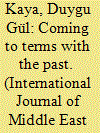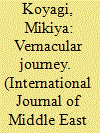|
|
|
Sort Order |
|
|
|
Items / Page
|
|
|
|
|
|
|
| Srl | Item |
| 1 |
ID:
141810


|
|
|
|
|
| Summary/Abstract |
This article examines the growing interest in questions of memory, trauma, and justice in Turkey, with a special focus on the notion of “coming to terms with the past.” Through an analysis of key academic and popular texts published between 2002 and 2013, it argues that “coming to terms with the past” is a therapeutic public discourse that rewrites national history through the temporality of trauma. In other words, this discourse reconfigures the sequence of past, present, and future as the beginning, development, and end of a case of collective trauma, applying the psychotherapeutic terminology of victimhood, healing, and forgiveness to social realities. The article offers new perspective on existing debates over “coming to terms with the past” by analyzing the limits of this therapeutic discourse and by exploring the potential and open-endedness of the politics of memory in Turkey.
|
|
|
|
|
|
|
|
|
|
|
|
|
|
|
|
| 2 |
ID:
141812


|
|
|
|
|
| Summary/Abstract |
Soon after its founding in the early 1980s, the Lebanese political organization Hizbullah developed a specific practice of remembering its dead. In this article, I argue that through this practice Hizbullah constructed an elaborate conception of time and history that gave ideological coherence to the movement's main political project, al-muqāwama al-islāmiyya (Islamic Resistance). Examining early writings in the Hizbullah weekly al-ʿAhd published during the organization's formative period, I show how such writings were instrumental in producing ideological templates that have continued to be replicated until today. Through a set of ritualistic practices, Hizbullah-affiliated intellectuals have archived everything related to martyrs and other kinds of human legacies, a process that has fed into the notion of an ever-present, and at times anticipated, era (ʿahd) of resistance. Moreover, the project of Islamic Resistance has gained salience each time the past is relived in the present, producing political action. Hizbullah's efforts at history writing have involved a transmission of ethics through martyrs' act of witnessing and their testimony to a way of life. Analyzing this phenomenon sheds light on the way political Islamic groups such as Hizbullah articulate national imaginaries through specific kinds of ideological production.
|
|
|
|
|
|
|
|
|
|
|
|
|
|
|
|
| 3 |
ID:
141811


|
|
|
|
|
| Summary/Abstract |
While the idea that Saudi Arabia has functioned as a beacon of ultraconservative religious influence since the 1970s oil boom is commonplace, the modalities of this influence have rarely been seriously interrogated. As a window onto this issue, this article considers the history of the Islamic University of Medina, an influential Wahhabi missionary project with global ambitions. It pays particular attention to the role played by non-Saudi staff, who for long periods made up a majority of the university's faculty. Previous accounts of migrants working in Saudi religious educational institutions have tended to focus on the contested question of their contribution to the rise of politically activist modes of Islamism within the kingdom. In contrast, the account offered here draws on the concept of spiritual capital to argue that they also played an important part in legitimizing the expansion of the Wahhabi mission to diverse Muslim communities around the world.
|
|
|
|
|
|
|
|
|
|
|
|
|
|
|
|
| 4 |
ID:
141809


|
|
|
|
|
| Summary/Abstract |
The growing strength of self-help literature in Egypt represents a new cultural expression of accommodation with capitalism, and markedly expands the mix of modern ideas and ethical practices rendered legitimate through association with tradition. The ideas and practices found in self-help, however, are anything but traditional. In its style and content, self-help expresses the values of individualism and neoliberal understandings of subjectivity. Informed by modern insights into the self and its formation, the genre blurs the boundary between psychology and religion, valorizing the process of self-exploration and self-fulfillment. The inherent message of self-help is not simply the glorification of the individual but, more pointedly, the sacralization of the self and subjective life choices—an interpretive trend that, in Egypt, simultaneously functionalizes Islam and fosters new understandings of what it means to be Muslim.
|
|
|
|
|
|
|
|
|
|
|
|
|
|
|
|
| 5 |
ID:
141813


|
|
|
|
|
| Summary/Abstract |
Exploring how railway technology was incorporated into the everyday lives of Iranians during the second quarter of the 20th century, this article focuses on spatial discourses and practices around the Iranian railway. The first part investigates Iranian journalists' construction of the railway traveler prototype as the propagator of modernity prior to the completion of the Trans-Iranian Railway in 1938. The second part shows how in the 1940s the railway space became a microcosm of the heterogeneous Iranian nation, and explores how middle-class travelers experienced the railway space. I argue that the railway space, rather than creating a homogeneous experience of railway journeys, was conducive to fragmented experiences among its diverse occupants, who were divided by religion, socioeconomic status, cultural orientation, and ethnicity. The visibility of heterogeneity in the railway space compelled modern middle-class travelers to consolidate their class identity and distinguish themselves from the rest of Iranian society. Wanting to achieve a homogeneously Europeanized Iran, they also felt compelled to travel the country more extensively to create a national community connected through direct interaction.
|
|
|
|
|
|
|
|
|
|
|
|
|
|
|
|
| 6 |
ID:
141814


|
|
|
|
|
| Summary/Abstract |
This article focuses on petitions by Ottoman women from Greater Syria during the late Ottoman era. After offering a general overview of women's petitions in the Ottoman Empire, it explores changes in women's petitions between 1865 and 1919 through several case studies. The article then discusses women's “double-voiced” petitions following the empire's defeat in World War I, particularly those submitted to the King-Crane Commission. The concept of “double-voiced” petitions, or speaking in a voice that reflects both a dominant and a muted discourse, is extended here from the genre of literary fiction to Ottoman women's petitions. We argue that in Greater Syria double-voiced petitions only began to appear with the empire's collapse, when women both participated in national struggles and strove to protect their rights as women in their own societies.
|
|
|
|
|
|
|
|
|
|
|
|
|
|
|
|
|
|
|
|
|